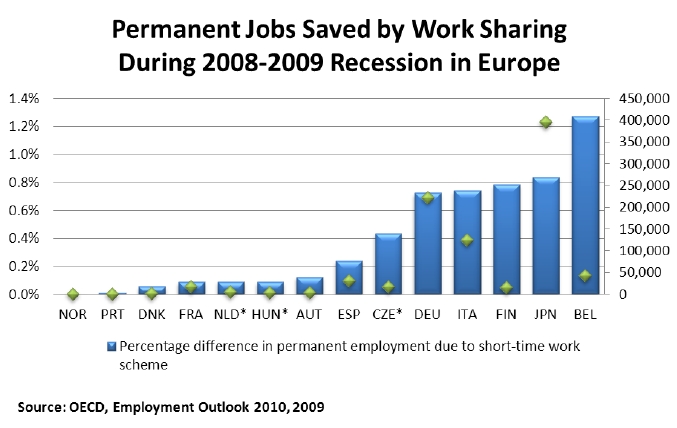June 24, 2011
Yesterday CEPR released a new report about how work sharing can help prevent layoffs and reduce unemployment, On the same day, both the Center for American Progress and the New America Foundation also published issue briefs about work sharing.
Really, it was a coincidence! But is it a sign that work sharing is an idea whose time has come?
As “the first of our ideas that we believe could be achievable in Washington today,” CAP’s proposal provides context and analysis of how work sharing fits in today’s political context. It concludes:
Work sharing may not create jobs, but it will certainly help keep those who have a job at work if employers need to reduce hours. We’ve seen this policy work—very effectively—in other countries. And it’s a relatively simple (and cheap) way to reduce unemployment here at home. For workers and their families and for the broader pace of economic recovery, Congress clearly needs to consider these job-sharing ideas, and soon.
NAF’s policy brief goes into more detail, looking at the effects of work sharing in OECD countries, with special focus on Germany and Canada, as well as in the U.S. states that currently have work sharing programs in place.

It concludes:
[W]ork sharing schemes hold important benefits for workers, employers, and the broader economy by allowing employees to maintain their connection to the workforce, helping employers retain valued employees and avoid the cost of retraining new workers after the recession, and encouraging market-level stability in the level of consumption… While it might be too late for the United States to fully benefit from such a program in the current unemployment crisis, the creation of a national program would act as a beneficial automatic stabilizer during future economic downturns.
CEPR’s report complements the briefs above, outlining a proposal for a system of work sharing as an alternative to laying off workers and also presenting hypothetical take-up rates and the likely impact of work sharing on productivity in the U.S.
Work sharing bills were introduced in the last Congress, and Sen. Jack Reed plans to reintroduce legislation to incentivize work sharing. The Administration’s FY12 Budget also includes a proposal to support work sharing, stating:
To help employers keep workers on the job, the Budget will encourage States to expand use of short-time compensation… Also known as work-sharing, this voluntary employer program helps firms retain workers by reducing employees’ weekly hours instead of laying them off.
1 day, 3 reports. A neat coincidence, and more impotantly, a strong indicator that work sharing deserves serious consideration as the nation continues to struggle with high unemployment.






